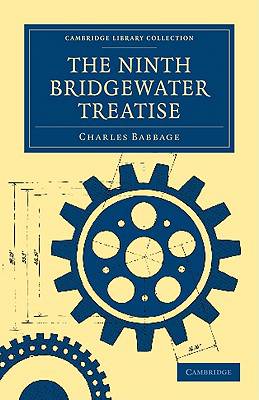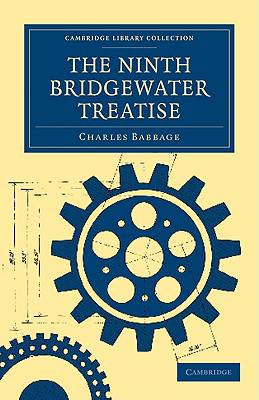
- Afhalen na 1 uur in een winkel met voorraad
- Gratis thuislevering in België vanaf € 30
- Ruim aanbod met 7 miljoen producten
- Afhalen na 1 uur in een winkel met voorraad
- Gratis thuislevering in België vanaf € 30
- Ruim aanbod met 7 miljoen producten
Zoeken
Omschrijving
Charles Babbage (1791-1871) was an English mathematician, philosopher and mechanical engineer who invented the concept of a programmable computer. From 1828 to 1839 he was Lucasian Professor of Mathematics at Cambridge, a position whose holders have included Isaac Newton and Stephen Hawking. A proponent of natural religion, he published The Ninth Bridgewater Treatise in 1837 as his personal response to The Bridgewater Treatises, a series of books on theology and science that had recently appeared. Disputing the claim that science disfavours religion, Babbage wrote 'that there exists no such fatal collision between the words of Scripture and the facts of nature'. He argues on the basis of reason and experience alone, drawing a parallel between his work on the calculating engine and God as the divine programmer of the universe. Eloquently written, and underpinned by mathematical arguments, The Ninth Bridgewater Treatise is a landmark work of natural theology.
Specificaties
Betrokkenen
- Auteur(s):
- Uitgeverij:
Inhoud
- Aantal bladzijden:
- 252
- Taal:
- Engels
- Reeks:
Eigenschappen
- Productcode (EAN):
- 9781108000000
- Verschijningsdatum:
- 20/07/2009
- Uitvoering:
- Paperback
- Formaat:
- Trade paperback (VS)
- Afmetingen:
- 140 mm x 213 mm
- Gewicht:
- 317 g

Alleen bij Standaard Boekhandel
+ 55 punten op je klantenkaart van Standaard Boekhandel
Beoordelingen
We publiceren alleen reviews die voldoen aan de voorwaarden voor reviews. Bekijk onze voorwaarden voor reviews.








